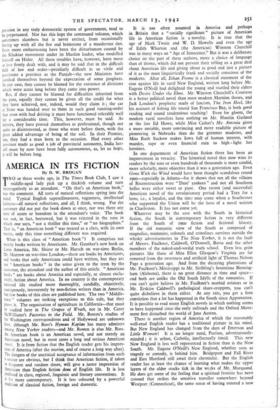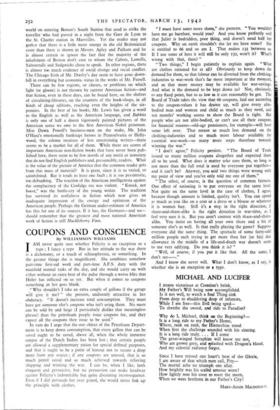AMERICA IN ITS FICTION
By D. W. BROGAN
TWO or three weeks ago, in The Times Book Club, I saw a middle-aged lady pick up a thickish volume and turn interrogatively to an attendant. " Oh that's an American book," was the comment. All sorts of natural reflections spring into the mind. Typical English superciliousness, vagueness, intellectual laziness—all natural reflections, and all, I think, wrong. For the customer did not put the book down at once, nor was there any note of scorn or boredom in the attendant's voice. The book was not, in fact, borrowed, but it was rejected in the tone in which one says, " not a thriller this time," or " no biographies." That is, " an American book " was treated as a class, with its own merits, only this time something different was required.
What is this class of " American book"? It comprises not merely books written by Americans. Mr. Gunther's new book on Latin America, Mr. Shirer or Mr. Harsch on war-time Berlin, Mr. Murrow on war-time London,—these are books by Americans, and books that only Americans could have written, but they are not "American books " in the sense given to the term by the customer, the attendant and the author of this article. "American books " are books about America and especially, or almost exclu- sively, fiction about America. In no country is the contemporary national life studied more thoroughly, candidly, objectively, courageously, irreverently by non-fiction writers than in America, but few books of this class are published here. The two " Middle- town " volumes are striking exceptions to this rule, but they prove it. The organisation of agriculture in California—that must be studied here in The Grapes of Wrath, not in Mr. Carey McWilliams's Factories in the Field. Mr. Rosten's studies of the Washington correspondents and of Hollywood are unknown here, although Mr. Ross's Hyman Kaplan has many admirers among New Yorker readers—and Mr. Rosten is also Mr. Ross. An American book is an American novel, and not merely an American novel, but in most cases a long and serious American novel. It is from fiction that the English reader gets his impres- mon of America (after the movies, and of course a long way after). The dangers of the uncritical acceptance of information from such a source are obvious, but I think that American fiction, if taken In frequent and random doses, will give a juster impression of American than English fiction does of English life. It is less Confined in class, regional, linguistic and literary conventions. It is far more contemporary. It is less coloured by a powerful tradition of classical fiction, foreign and domestic. It is too often assumed in America and perhaps in Britain that a " socially significant " picture of American life in American fiction is a novelty. It is true that the age of Mark Twain and W. D. Howells and even the age of Edith Wharton and (the American) Winston Churchill was in many ways an " Age of Innocence." But it was a deliberate choice on the part of these authors, more a choice of language than of theme, which did not prevent their telling us a great deal about American life and giving about as good and just a picture of it as the most linguistically frank and socially conscious of the moderns. After all, Ethan Frome is a classical statement of the case against life in rural New England, written long before Mr. Eugene O'Neill had delighted the young and startled their elders with Desire Under the Elms. Mr. Winston Churchill's Coniston is a better political novel than most modern Marxian theses, and Jack London's prophetic study of fascism, The Iron Heel, like his account of fishing life round San Francisco Bay, is both good reading and sound tendentious teaching! Even for gloom, the modern rural novelists have nothing on Mr. Hamlin Garland or the late Ed Howe, while Miss Cather's My Antonia gives a more amiable, more convincing and more readable picture of pioneering in Nebraska than do the grimmer modems, and Miss Ruth Suckow makes Iowa full of human interest, with murder, rape or even financial ruin to high - light her heroines.
In one department of American fiction there has been an improvement in veracity. The historical novel that now wins its readers by the tens or even hundreds of thousands is more candid, • more scholarly, more objective than it was a generation ago. Even Gone With the Wind would have been thought scandalous round t9oo—especially in Atlanta—for it shows that not all the villains of Reconstruction were " Dam' yankees " and not all Southern belles were either sweet or pure. One recent (and successful) American novel of the revolutionary period had a Tory for a hero, i.e., a loyalist, and the time may come when a Southerner who supported the Union will be the hero of a novel written in Charleston. It has not come yet.
Whatever may be the case with the South in historical fiction, the South in contemporary fiction is very different from the South of 19oo fiction and fictional history. If the old romantic view of the South as composed of magnolias, mammies, colonels and crinolines survives outside the whisky advertisements in The New Yorker, it is not the fault of Messrs. Faulkner, Caldwell, O'Donnell, Basso and the other members of the naked-and-sordid truth school. Even less grim pictures like those of Miss Ellen Glasgow's Virginia are far removed from the sweetness and artificial light of Thomas Nelson Page a generation ago. And from the decaying plantations of Mr. Faulkner's Mississippi to Mr. Stribling's boomtime Birming- ham (Alabama), there is no great distance in time and space— and both are unlike the Old South Idylls of the romantics. If you can't quite believe in Mr. Faulkner's morbid aviators or in Mr. Erskine Caldwell's pathological share-croppers, you can't quite disbelieve in them either. At any rate, you get a firm conviction that a lot has happened in the South since Appomattox. It is possible to read many English novels in which nothing seems to have happened since the early railroads and the Oxford Move- ment first disturbed the world of Jane Austen.
There is another region of America of which the reasonably well-read English reader has a traditional picture in his mind. But New England has changed from the days of Emerson and Little Women! It is no longer rural, Puritan, adventurously- minded ; it is urban, Catholic, intellectually timid. This new New England is less well represented in fiction than is the New South. Mr. Eugene O'Neill's New England, whether seen as tragedy or comedy, is behind him. Bridgeport and Fall River and East Hartford still await their chronicler. But the English reader has at least the chance of learning what makes the upper layers of the older stocks tick in the wcrks of Mr. Marquand. He does get some of the feeling that a spiritual frontier has been crossed that strikes the sensitive traveller somewhere beyond Westport (Connecticut), the same sense of having entered a new
world on entering Boston's South Station that used to strike the traveller who had passed in a night from the Gare de Lyon to the St. Charles station in Marseilles. Yet the reader may not gather that there is a little more energy in the old Brahminical caste than there is shown in Messrs. Apley and Fulham and he is almost certain to ignore the fact that the majority of the inhabitants of Boston don't care to whom the Cabots, LoweIls, Saltonstalls and Sedgwicks chose to speak. In other regions, there is almost too much evidence of social change and racial conflict. The Chicago Irish of Mr. Dooley's day seem to have gone down- hill in everything but economic status in the works of Mr. Farrell.
There can be few regions, or classes, or problems on which light (or gloom) is not thrown by current American fiction—and that fiction, even in these days, can be found here, on the shelves of circulating-libraries, on the counters of the book-shops, in all kinds of cheap editions, reaching even the heights of the six- pennies. In the best of his books, Mr. Lewis has given a word to the English as well as the American language, and Babbitt is only one of half a dozen vigorously painted pictures of the American scene we owe to the first American Nobel prizeman. Miss Dawn Powell's business-men on the make, Mr. John O'Hara's emotionally bankrupt heroes in Pennsylvania or Holly- wood, the solemn treatises of less entertaining writers—there seems to be a market for all of them. While there are scores of important American non-fiction books that have never been pub- lished here, there seem to be few novels of any merit or notoriety that do not find English publishers and, presumably, readers. What is the value of the picture of America that the common reader gets from this mass of material? It is great, since it is so varied, so uninhibited. But it tends to have one fault ; it is too pessimistic, too debunking. The reaction of the American intelligentsia against the complacency of the Coolidge era was violent. " Knock, not boost," was the battle-cry of the young writer. The tradition has survived its usefulness in fiction which now gives an inadequate impression of the energy and optimism of the American people. Perhaps the German under-estimate of America has this for one of its sources. If it has, the Germans—and we— should remember that the greatest and most national American work of fiction is still Huckleberry Finn.



























 Previous page
Previous page